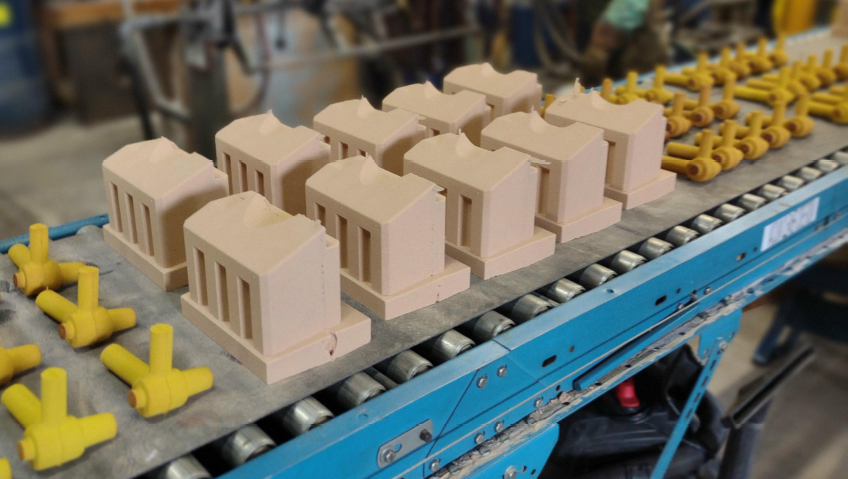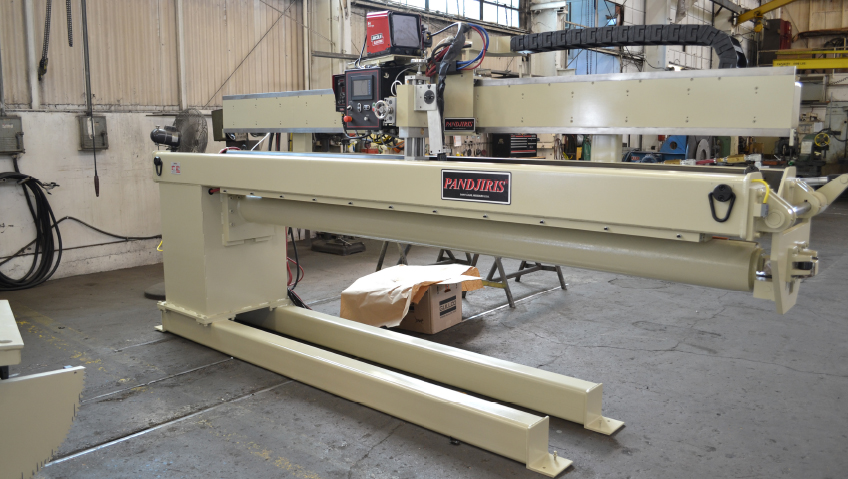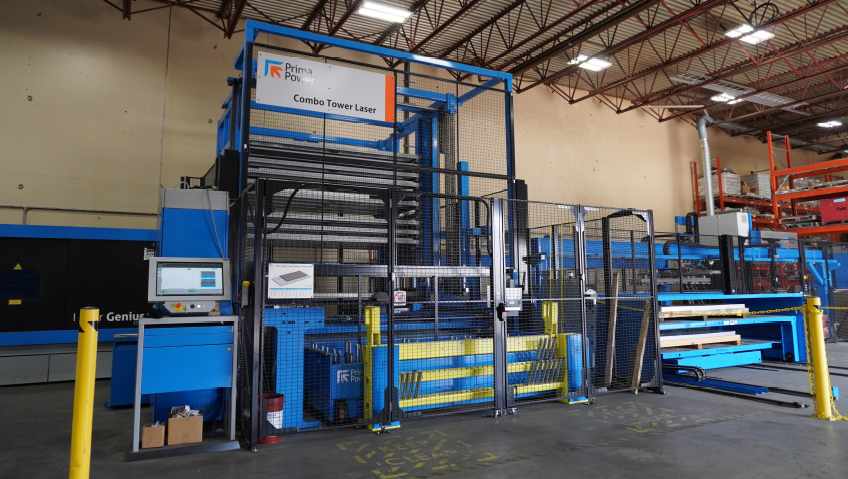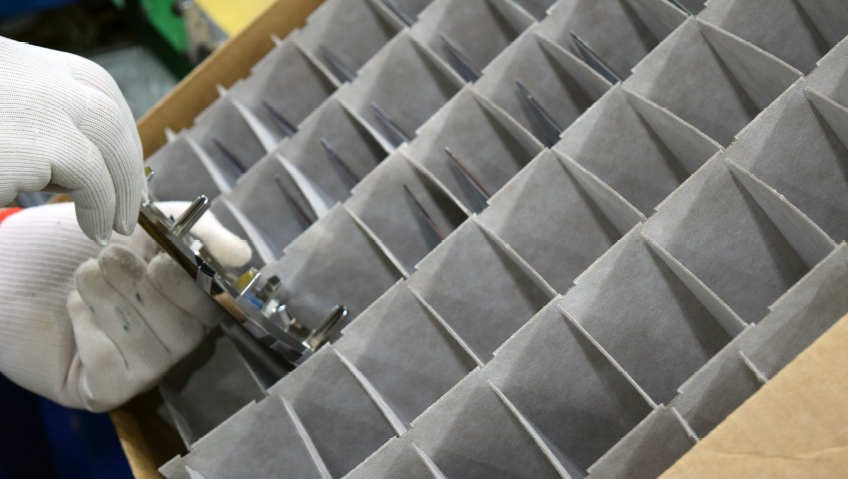Manufacturers and factory owners looking for metal stamping presses and forming equipment would do well to check out Stamtec, a company based in Manchester, Tennessee which specializes in mechanical, forging, and servo presses manufactured by its Taiwanese parent company Chin Fong Machine Industrial Co., Ltd. Its roughly 20 employees offer comprehensive client support.
Previously profiled in October 2023 in Manufacturing in Focus magazine, Stamtec has bounced back from the COVID pandemic which greatly impacted oceanic transportation a few years ago. Indeed, business has been excellent as of late.
“We’ve sold and installed a number of really large presses. We’ve had two record years: 2023 turned out to be a record year, and 2024 was close,” says North American Sales Manager Lee Ellard, with pride.
“We probably have the broadest product line in the industry, from small 35-ton presses all the way up to 4,000-ton presses,” he continues. “The construction and quality of our machines is proven. We’re not the cheapest on the block, but we’re definitely the best value.”
Mechanical presses, which come in gap frame, straight-side, eccentric-geared, and crank shaft varieties, continue to be Stamtec’s most popular offering. Forging presses are available in cold forging and warm/hot forging styles while servo presses represent a category on the rise. The company’s servo presses are equipped with low-RPM, high-torque servomotors and press controls from firms such as Mitsubishi Electric, Allen-Bradley, and Siemens.
“The servo press [market] is growing,” says Ellard. “Forging is a niche market. It’s rather small in the U.S., and we’re very much interested in doing more in that market.”
Stamtec was launched in 1984 and is based in a 72,000-square-foot facility approximately an hour southeast of Nashville. It has sold over 2,000 presses. The company’s operations extend into Querétaro, Mexico, where it runs a 10,000-square-foot plant with eight employees. The Mexican branch provides metal stamping presses, parts, service, and support for clients in Central and South America.
Founded in the late 1940s, Chin Fong has ISO certification, over 6.5 million square feet of manufacturing space, and employs roughly 1,500 people in multiple plants across Asia. It produces more than 3,000 presses annually. These machines feature high-end steel plates; precision-machined frame components; robust gears, drive trains, brakes, and clutches, all manufactured in Chin Fong factories; and copper bushings.
Stamtec deals solely with Chin Fong equipment. After being manufactured in Asia, these wares are shipped across the ocean to the U.S. Smaller-sized equipment arrives more or less fully assembled, “maybe with a few components removed for shipping,” says Ellard, while larger presses arrive “pretty much completely disassembled.” These larger presses are reassembled by company staff either in the company plant or at the customer’s site.
“Probably 80 percent of the time, we end up handling the transportation [of presses to the client],” says Ellard. “But the customers are completely free to arrange their own inland transportation, either from a U.S. port or from Stamtec. Sometimes, it doesn’t make sense to ship from Stamtec, when it’s five truck loads and a million-pound or half-a-million-pound press.” Given the cost of transporting such gigantic presses, Stamtec usually has them shipped directly from port to client without stopping in at company headquarters.
At any given time, the company has a vast array of presses available for delivery at its Manchester headquarters. “We keep about 50 to 60 presses in inventory at Stamtec—smaller presses, from 35 tons to 600 tons. Most anything above that gets shipped direct to the customer.”
Once a press of any size reaches the customer, a Stamtec project manager supervises the installation. For big presses, this process usually involves a rigger operating a specialized crane or other heavy lifting equipment. And, while happy to offer guidance, Stamtec leaves the rigging to specialized professionals. “The rigger is typically hired by the customer, or they could be hired by us. The rigger does the actual stacking and assembly of the machines. We’ll have somebody there to supervise and assist with that, and to hook up the internal plumbing and various internal components [to make it] functional,” explains Ellard.
After a press is assembled, Stamtec starts the machine and puts it through a test run to ensure everything is working properly. The company’s customers can receive training on proper use of the equipment, and are provided with information concerning inspection, compliance, and maintenance. Customers can buy presses either directly from Stamtec or through a distribution network.
Stamtec also supplies feed and coil handling equipment designed to enhance quality, speed, and precision in stamping applications and quick die change systems for greater speed and productivity and less downtime. In addition to presses, the company has a huge supply of spare parts and offers wide-ranging backup to its customers. It has “a central location in the United States and a full team of service technicians in the field and some satellite representatives with service capabilities for remote areas; we have really good coverage,” says Ellard. “We don’t just stock machines; we really support them very well after the sale.”
Mechanical and electrical engineers and other support staff are on hand in Manchester. As Ellard notes, the company maintains a network of satellite support service centers across the U.S. and into Canada, and clients who encounter problems can contact them at any time. Depending on the issue, support is offered by phone, email, text, or via an in-person visit.
Inspection and maintenance services are also available, and the company can send staff to investigate metal presses at a customer’s site. Inspectors check gears, bushing clearance, drive shaft operation, electrical controls, foundation, frame, lubrication system, and other aspects of the machinery. Customer support videos are even available on the company website, and Stamtec also offers accessories, upgrades, repairs, and rebuilds.
Stamtec’s presses are sometimes included in packages put together by automation integrators as well. “Quite a few integrators have discovered that we’ve very flexible and easy to work with,” says Ellard. “Then there are times when we might actually integrate a feed line, transfer system, conveyors, and other things ourselves. We have project managers who are prepared to do that.”
Automotive continues to make up the bulk of the company’s business, accounting for roughly 60 to 70 percent of revenue. Other major markets served include appliances, solar, hardware, fasteners, and electronics. As of late, Stamtec has been doing an increasing amount of business with electric vehicle firms, providing equipment to make battery trays and chassis components. High-profile customers include Lear Automotive, Toyota, Honda, and Ford, plus General Electric, Electrolux, ThyssenKrupp, Hitachi, and Maytag. The team also works with many “Tier 2 and 3 supporters of these big companies.”
While the majority of its customers are based in the United States, the company also does business in Canada and further afield. Stamtec is occasionally hired by American companies that want to set up stamping presses in other countries, and of course, the Mexican branch keeps busy with its own clients.
The company attends trade shows for networking, information gathering, and promotion. These include Fabtech, which is to be held in Chicago in September. Forge Fair is another trade show at which Stamtec makes an appearance, held in Cleveland, Ohio in mid-May. Stamtec occasionally hosts seminars at its Manchester facility and participates in smaller events, such as the Precision Metalforming Association’s supplier nights as well.
In terms of personnel, Stamtec prefers to hire people “with a positive, can-do attitude” who are “focused on the success of the customer. Keeping them up and running… That’s ultimately how we make our money,” says Ellard.
As for challenges facing the company, he expresses some concerns about newly implemented tariffs. He is unsure how these measures might impact the company, given that its equipment is made offshore. Beyond that, he cites “just the normal business challenges of meeting new customer demand and fighting competition from all over the world.”
Going forward, metal stamping presses and forming equipment will remain mainstays for Stamtec. That said, Ellard would like to see certain segments of the business grow. The company aims to “continue to evolve our servo press technology, which is still a relatively small part of our business—but growing,” he shares. “We also want to work with more automation integrators to provide complete production systems.”






